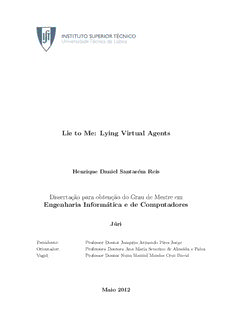
Lie to Me: Lying Virtual Agents Dissertaç˜ao para obtenç˜ao do Grau PDF
Preview Lie to Me: Lying Virtual Agents Dissertaç˜ao para obtenç˜ao do Grau
Lie to Me: Lying Virtual Agents Henrique Daniel Santar´em Reis Disserta¸ca˜o para obtenc¸˜ao do Grau de Mestre em Engenharia Inform´atica e de Computadores Ju´ri Presidente: Professor Doutor Joaquim Armando Pires Jorge Orientador: Professora Doutora Ana Maria Severino de Almeida e Paiva Vogal: Professor Doutor Nuno Manuel Mendes Cruz David Maio 2012 2 Acknowledgements First I would like to thank IST-Taguspark, INESC-ID and GAIPS for the condition which enabled me to develop my work. To my advisor Ana Paiva, for all the support, motivation and opportunity to work at GAIPS. I would also like to thank everyone at GAIPS for their help throughout my work. A special thanks to Jo˜ao Dias for following my work closely, for the new ideas, discussions and supporting me in the hardest moments. Another special thanks to Henrique Campos, Joana Almeida and Andr´e Carvalho for great companionship, support and for enduring this journey with me. Finally, to my parents and girlfriend, who provided the greatest amount of motivation. Lisboa, May 14th 2012 Henrique Reis 4 To my family and girlfriend for all their support and patience 6 Resumo O objectivo da nossa tese foi o de dotar agentes virtuais com a capacidade de modelar a mente de outros agentes e usar essa informa¸c˜ao no seu racioc´ınio. Estendemos uma arquitectura j´a existentecomumn´ıveldeTeoriadaMenteparaNn´ıveis. Quisemosavaliarseagentescapazesde utilizarmaisdoqueumn´ıvelseriampercepcionadoscomosendomaisinteligentesemcomparac¸˜ao com agentes que apenas usam um n´ıvel, focando-nos na noc¸˜ao de engano. Revimos conceitos- chave sobre este assunto utilizando trabalhos espec´ıficos da ´area de Psicologia que se focavam em enganar, mentira e Teoria da Mente, assim como trabalhos que tinham como objectivo implementar sistemas num contexto parecido a este. Descrevemos o modelo conceptual que desenh´amos para alcan¸car o objectivo a que nos propusemos, seguindo depois para a descri¸c˜ao de como foi implementado. Para avaliar o nosso trabalho desenvolvemos um cen´ario de estudo baseado num jogo de bluff e mentira, fazendo duas vers˜oes, uma com um n´ıvel de Teoria de Mente e outra com dois. Grav´amos a aplica¸c˜ao a correr e fizemos v´ıdeos de demonstrac¸˜ao para avaliar a diferenc¸a do comportamento do agente mentiroso nas duas vers˜oes. A avalia¸c˜ao foi composta por testes preliminares, de simula¸c˜ao e atrav´es de um question´ario final, sendo esta u´ltima parte feita com 60 participantes. Os nossos resultados demonstraram-se consistentes com a nossa hip´otese de que quanto maior o n´ıvel de abstrac¸c˜ao de Teoria da Mente, melhor os agentes conseguem realizar tarefas que implicam enganar outr´em. 8 Abstract The objective of this thesis was to endow agents with the ability to model the mind of other agentsandtousethisinformationontheirreasoningprocess. Wewantedtoassessifareasoning ability capable of more then one level would be perceived as more socially intelligent than one with only one level, focusing our work on deception behaviour generation. Key concepts were reviewed regarding this topic, such as research work in the field of Psychology focused on deception, telling lies and Theory of Mind, in addition to some works which tried to implement systems with a similar goal. We proceeded by describing the conceptual model to achieve our proposed goal, based on the Mindreading model of Baron-Cohen, to update N levels of a Theory of Mind. An implementation specification was describe, explaining how we implemented our model using an existing autonomous agent architecture and other frameworks. For the evaluation stage we developed a case study based on a deception game and made two version of liars: a one level and a second level Theory of Mind. We recorded the application running and made demonstration videos to evaluate the differences in the deceptive behaviour. The evaluation itself was composed of preliminary, simulation and a final questionnaire. The latter were performed with 60 participants. The results showed to be consistent with our hypothesis that the more reasoning abstraction level of a Theory of Mind, the better agents can performed deceptive tasks. 10
Description: